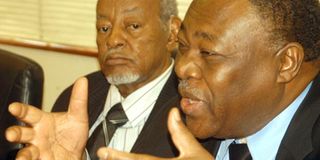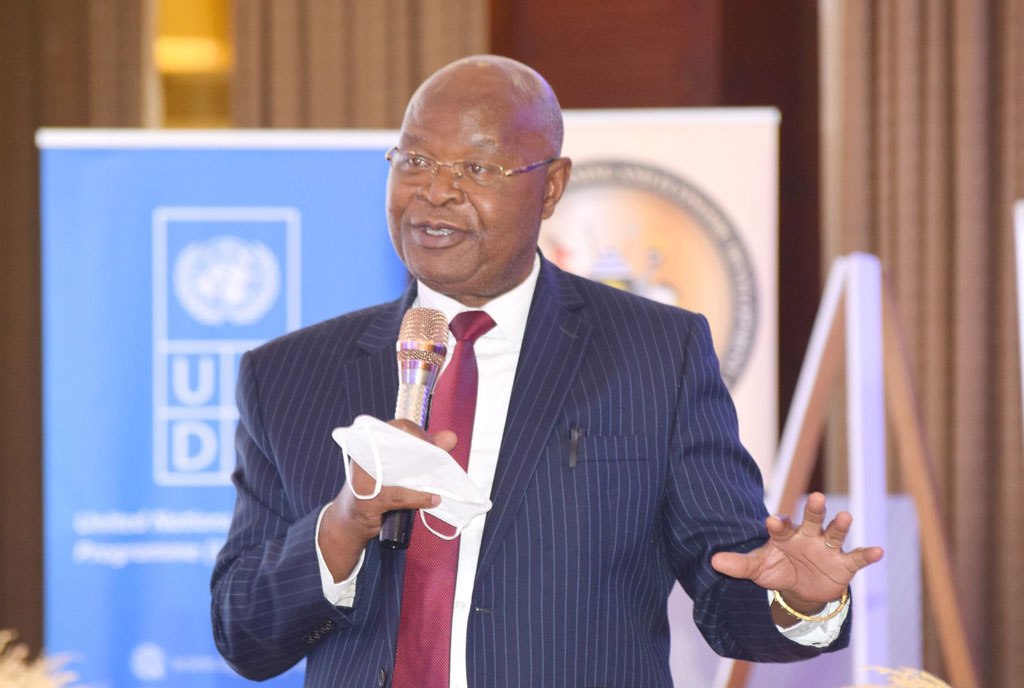Sudanese factions rush to Kampala

Mahdi Ibrahim Mohamed (R), a member of the Khartoum delegation and his counterpart Ahmed Abd Al-Rahman Mohamed, speak to journalists at their embassy in Kampala yesterday. PHOTO BY JOSEPH KIGGUNDU.
What you need to know:
Delegations from Khartoum and South Sudan pitch camp in Kampala as warring nations shift fight to diplomatic front.
KAMPALA
Delegations from Sudan and South Sudan are in the country marshalling support for either side’s position in the on-going North-South conflict on the first leg of what promises to be frantic wave of shuttle diplomacy in the region.
The dispute, which threatened to escalate into full scale war a week ago, has displaced thousands of civilians, majorly on the South Sudanese side. The areas in dispute include oil-rich Kafan Dabi, Kafia Kenji, Griba, Kawda, Buhairat Abyad and Elfoge localities
By press time yesterday, International Affairs Minister Oryem Okello could not be reached as his known mobile numbers were switched off.
President Museveni’s spokesperson Tamale Mirundi was also locked up in meetings, with an aide answering his calls.
Sources, however, told this newspaper that the South Sudanese delegation, led by the South Sudanese Information Minister, Dr Barnabas Mariel Benjamin, held a closed-door meeting with Foreign Affairs Ministry officials most of yesterday afternoon. The Khartoum delegation, on the other hand, met with Deputy Speaker of Parliament, Mr Jacob Oulanyah.
Both delegations, however, held press conferences where they expressed the wishes of their governments.
At the Kampala Serena Hotel, Dr Mariel said his government would not be drawn into a “senseless war” with Khartoum but said its security forces would defend its “sovereign boundaries” at any cost. He also called on regional leaders and the UN to rescue over 12,000 South Sudanese trapped in the North.
In March, Sudan halted river flow from north to the South over allegations Juba was using the Nile to transport weapons.
At the beginning of May, Khartoum ordered over 12,000 South Sudanese to leave Kosti Post, where they had been waiting for transportation for over a month.
The head of the Khartoum delegation and former Interior minister, Mr Ahmed Abd Al-Rahman Mohamed, told journalists at the Sudanese embassy that a regional parliamentary committee would visit the two warring countries “and find out the truth and the cause” of the conflict. They said they would also visit Kenya and Rwanda.
“We believe that it’s time for Parliament and civil society to have a say on what is going on in the country because MPs are peoples’ representatives and it’s people who suffer whenever there is war,” he said.
The delegation also accused South Sudan of occupying an additional seven areas in the north, saying Khartoum will be forced to bomb these areas in Blue Nile and South Kordofan if SPLA soldiers don’t withdraw.
Dr Mariel, however, denied any links with SPLM North, saying it was a military outfit not party to South Sudan. The Juba delegation said although Khartoum claims it had ceased any hostility in the disputed border areas, air raids have not stopped, the latest being at the beginning of May.
Dr Mariel said the SPLM had withdrawn from all the disputed border areas, in response to a UN Security Council resolution. He said Khartoum’s Sudanese Armed Forces had also shut down all possible entry and exit points to South Sudan, trapping scores of innocent southerners in the North. He also said elements of the LRA had been moving in and out of Southern land, operating from Khartoum. However, the Khartoum delegation, accused Israel and the US of using South Sudan to distabilise Sudan.
Dr Mariel on the other hand asked Khartoum to show respect for democratically-elected leaders. “We had a wonderful and peaceful divorce from Khartoum following a referendum. President Bashir has, however, continued to threaten to overthrow the legitimately elected government of South Sudan.”
Sudanese President Omar Al Bashir has in the past threatened to “free the South Sudanese” from “their oppressors”. But Dr Mariel said his government would leave power if South Sudanese decided so.



